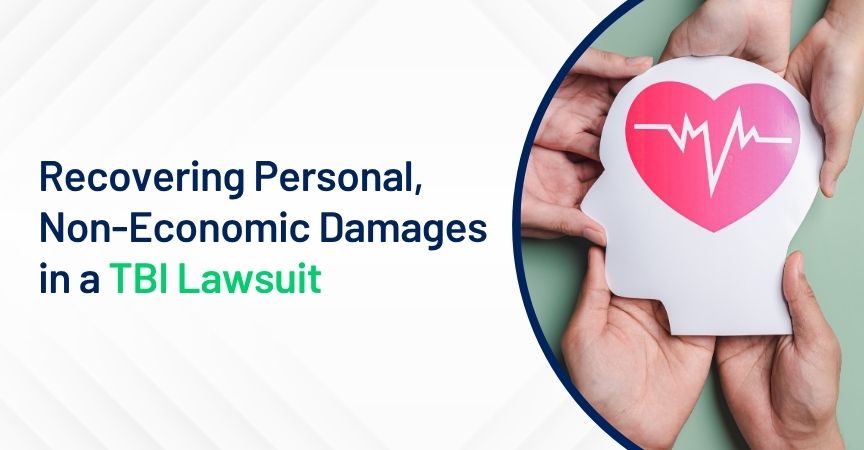A traumatic brain injury can change a person’s life in an instant, not just physically but emotionally and psychologically. While medical bills and lost income represent clear financial losses, many of the most devastating effects of a TBI are not easily quantifiable, yet they require a monetary valuation. Pain and suffering, trauma, and the loss of enjoyment of life can all be recovered as non-economic damages in a traumatic brain injury (TBI) lawsuit, and they are just as crucial to a victim’s recovery as physical needs.
When pursuing a TBI lawsuit, it is critically important to understand how personal (also known as non-economic) damages can impact your claim as complete compensation for victims and their families can help you recover and move forward with your lives. Continue reading to learn more about recovering personal damages in TBI lawsuits.
Understanding Traumatic Brain Injuries
A Traumatic Brain Injury (TBI) is brain trauma resulting from a substantial bump, blow, or jolt to the head or from an object penetrating the brain. The CDC reports that motor vehicle accidents are one of the most common causes of TBIs.
TBIs are categorized from mild to severe depending on the type of impact, the area of the brain affected, and whether an object has penetrated the brain. Even mild TBIs can result in catastrophic injury, including immediate and delayed symptoms like brain bleeds, swelling, or contusions. These injuries can require extensive medical care to manage life-altering disabilities and changes to the victim’s quality of life, as well as severe distress, loss of enjoyment of life, and loss of consortium.
Non-Economic Damages: What Are They?
Personal damages are also known as non-economic damages. They refer to the personal losses that a person may experience following a Traumatic Brain Injury. These are different from economic damages because they do not involve financial losses, such as medical bills or lost wages. It can be incredibly challenging to place a monetary value on non-economic damages and requires a keen legal and medical understanding of traumatic brain injury, life-long challenges, and recovery, as well as the victim’s lifestyle and personal needs.
Non-economic damages include:
- Pain and suffering: This encompasses both physical and mental distress. Under California law, there is no cap on pain and suffering damages in personal injury cases, meaning victims can potentially file substantial claims for the negligence that caused their traumatic brain injury (TBI).
- Loss of consortium: Refers to the right to companionship with one’s partner, which a TBI may affect. This compensation can be claimed by the victim, a family member, or a spouse and covers the emotional loss resulting from the end of the partnership as it was.
- Loss of enjoyment of life: Describes the anguish caused when daily tasks, hobbies, and social activities become difficult or impossible due to a Traumatic Brain Injury.
- Emotional distress: Refers to the emotional harm a TBI may inflict. Some victims experience anxiety or depression as a result of their physical difficulties, while others may develop Post-Traumatic Stress Disorder from the event of the injury. TBI victims experiencing emotional distress deserve to be fairly compensated, making it vitally important to prove these often intangible losses to a jury.
Proving Non-Economic Damages
Due to the personal nature of non-economic damages, substantial evidence is required to support your case. Documentation and storytelling are crucial tools used by our experienced trial lawyers in TBI cases to not only help the court and jury understand the extent of the injury but also to help them visualize the suffering and immense losses the victim has faced due to another person’s negligence, thereby facilitating fair compensation.
Types of evidence include:
- Medical records: Detailed records can show the physical effects of your injury and help explain your pain and suffering.
- Testimony: From the victim, family members, and medical professionals offers a new depth of understanding. Statements from loved ones and doctors can provide the jury with a more detailed look at how injury has impacted the victim’s day-to-day life.
- Expert witnesses: Play a crucial role in TBI lawsuits. Their insight adds credibility to your case and, importantly, can build a meaningful story that helps the jury understand your situation.
- Visual documentation: Can be vitally important, as it allows the victim to share their life with the jury and illustrate what was taken away from them. At Rodriguez & Associates, our team will prepare a video that demonstrates the impact your TBI has had on your life, allowing the jury to understand and connect with your story.
Contact Our TBI Attorneys to Help
Rodriguez & Associates is a leading personal injury firm in Kern County with decades of experience handling traumatic brain injury claims. We combine a client-centered approach with access to industry-specific experts and the resources necessary to take cases to trial. Our proven track record includes securing record-setting compensation for victims of severe injuries, including a $35 million verdict—the largest motor vehicle collision verdict in Iowa history—for a young woman who suffered a catastrophic TBI.
With our client-centered approach, network of expert witnesses, and the resources to take your case to trial, the dedicated TBI attorneys at Rodriguez & Associates are here to guide you through your lawsuit and fight for the compensation you deserve. Contact us today to schedule a consultation.





